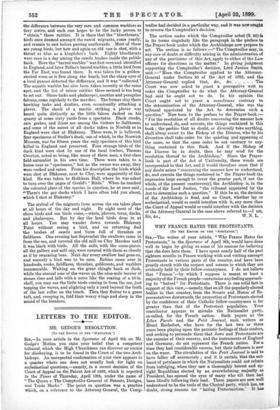LETTERS TO THE EDITOR.
MR. 0-EDGE'S RESOLUTION. [To THE EDITOR OP THE "SPECTATOR.") Sin,—In your article in the Spectator of April 8th on Mr. Gedge's Motion you state your belief that a competent tribunal, which the High Churchmen can discover no excuse for disobeying, is to be found in the Court of the two Arch- bishops. An unexpected confirmation of your view appears in a quarter where one does not usually look for light on ecclesiastical questions,—namely, in a recent decision of the Court of Appeal on the Patent Act of 1883, which is reported in the Times of Thursday, April 13th, under the name of "The Queen v. The Comptroller.Geneml of Patents, Designs, and Trade Marks." The point in question was a practice which, on a reference to the Attorney-General, the Comp-
troller had .decided.in a particular way, and it was now sought to reverse the Comptroller's decision.
The section under which the Comptroller acted (S.' 95):ie in its terms singularly like the paragraph in the preface to the Prayer-book under which the Archbishops now propose to act. The section is as follows':—" The Comptroller may,in any case of doubt or difficulty arising in the administration of any of the provisions of this Act, apply to either Of the Law officers for directions in the matter." In giving judgment supporting the Comptroller's decision, Lord Justice Smith said :—" Here the Comptroller applied to' the Attorney- General under Section 95 of the Act of 1883i and the Attorney-General replied that, &c., &c: . . . . . -The Court was now asked to grant a prerogative writ to order the Comptroller to do what the Attorney-General had said he ought not to do. In his opinion the Court ought not to grant a mandamus contrary to the determination of the Attorney-General, who was the tribunal appointed by the Act to determine such a question." Now turn to the preface to the .Prayei-boOk "For the resolution of all doubts concerning the manner how to understand, do, and execute, the things contained in this book ; the parties that so doubt, or diversely take anything, shall alway resort to the Bishop of the Diocese, who by his discretion shall take order for the quieting and appeasing of the same, so that the same order be not contrary to any- thing contained in this Book. And if the Bishop of the Diocese be in doubt, then he may send for the resolution thereof to the Archbishop." Since the Prayer- book is part of the Act of Uniformity, these words are incorporated in that Act, and it would therefore seem that if any doubt arises "concerning the manner how to understand, do, and execute the things contained in" the Prayer-book (an expression large enough to cover the greater part, if not the whole, of the present controversy), the Archbishop is, in the words of the Lord Justice, "the tribunal appointed by the Act to determine such a question." If this be so, the decision of the Archbishop is final, and no Court, whether lay or ecclesiastical, would or could interfere with it, any more than the Court of Appeal would or could interfere with the decision of the Attorney-General in the case above referred to.—I am;






































 Previous page
Previous page